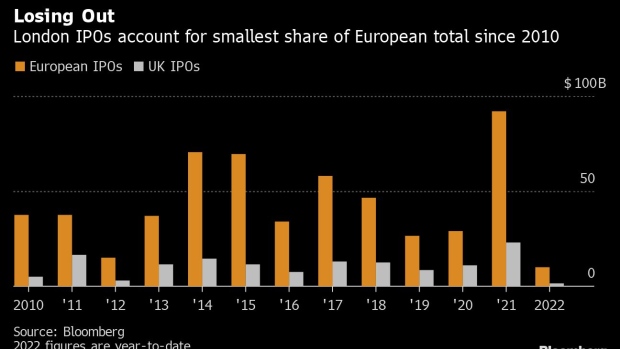Sep 30, 2022
London’s European Equity Market Crown Under Threat From Paris
, Bloomberg News

(Bloomberg) -- The crisis of confidence in UK assets is running so deep that the country is close to losing its crown of Europe’s biggest equity market.
This year’s decline in London stocks has reduced the combined market capitalization of companies with a primary UK listing to within touching distance of its nearest challenger, Paris. At the equivalent of $2.5 trillion, the gap between them is only $156 billion, close to the lowest on record, according to an index compiled by Bloomberg.
The differential between the UK and French markets has been gradually eroding since Britons voted to leave the European Union in 2016. But the unprecedented market turmoil unleashed in the past week by Prime Minister Liz Truss’s unfunded tax cuts has dealt a crucial blow, damaging economic confidence and sending the pound to a record low.
READ: UK Markets Have Lost $500 Billion Since Truss Took Over
“London’s crown as the top European trading center was already losing its shine even before this latest confidence crisis and the plunge in sterling, with the impact of post-Brexit trade issues still weighing on sentiment,” said Susannah Streeter, senior investment and markets analyst at Hargreaves Lansdown. “With concerns deepening about the Truss administration’s handling of the economy, optimism appears to be seeping away.”
UK equity fund outflows are on pace for their worst year ever at $18 billion, according to Bank of America Corp. data, citing EPFR Global.
Wednesday’s intervention by the Bank of England to calm markets has only “bought time” in stabilizing the pound and seeking to avoid broader deterioration in UK household finances and asset markets, Jefferies strategists led by Sean Darby wrote in a note.
READ: Britain’s Crisis of Confidence Was Years in the Making
Only once before has the value differential between the UK and French equity markets been narrower. That was in January this year when the third-largest company in the FTSE 100 Index, BHP Group Ltd., exited London.
The weakness of sterling since the Brexit vote has contributed to the decreasing value of London’s equity market, making British companies more attractive to foreign bidders. The UK has become a fertile ground for takeovers, also reflecting cheap valuations and lack of protectionism.
Another factor has been London’s increasingly fragile position as one of Europe’s premier listing venues. Just $1.38 billion has been raised through initial public offerings in the UK this year, representing 14% of the European total, the smallest share in more than a decade, according to data compiled by Bloomberg.
It’s not all doom and gloom. The weak currency is providing a big tailwind to UK large-cap earnings, with 75% of FTSE 100 revenues coming from overseas.
That means the blue-chip index is likely to continue outperforming the mid-cap FTSE 250, as long as recession fears persist and sterling remains under pressure, according to Liberum Capital strategist Susana Cruz.
(Updates with Bank of America flows data in fifth paragraph)
©2022 Bloomberg L.P.






